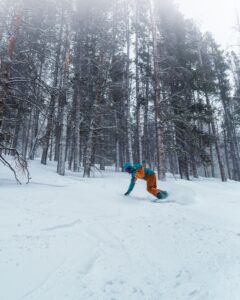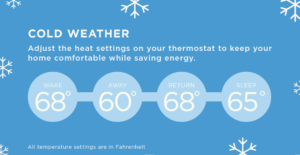Keep Warm During a Cold Winter
Cold weather can be hard to manage for many. Winter can be long and bitterly cold unless you enjoy winter activities like skiing and sledding. For many, winter means long months stuck inside or traveling through occasionally (or frequently) inclement weather. When the economy is poor and fuel prices are high, what can you do to get the most out of your heating costs?
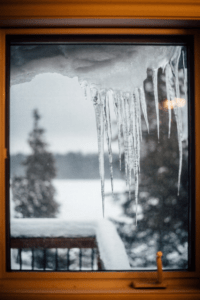
Rising Costs
The price of most heating methods has risen dramatically in the last year. Your cost will be higher no matter what method you use for heat. Fuel oil prices have doubled in some areas. Electric heat is more expensive than ever. Natural gas and propane costs have also risen. For those on fixed incomes, this can be especially dangerous. Wood stoves, which are not always terribly efficient, may have the best ability to control costs, provided you have access to wood. Make sure to store more than you think you may need and cover it so it is dry when you need it.
Extremes are Dangerous
Weather extremes in either direction can cost lives. Hot weather kills by causing heat stroke and dehydration. Cold weather leads to hypothermia where the body shuts down from the extremities inward to conserve heat to the core. According to Science Daily, cold weather is 20 times more deadly than hot weather.
Rental units may or may not have great insulation. Heat rises so tenants on upper floors will benefit from those below. Knowing where you are losing heat can help you find ways to slow heat loss. Most heat is lost through windows and doors. There are hacks you can utilize to minimize this.
Windows
If your unit has double-paned windows, you will lose less heat than with single-paned windows. With either, heat loss can be reduced by making sure the windows are completely closed and by sealing any cracks or leaks around the frame. You can also add an easy-to-install window insulation kit. Heavy curtains (or hanging a blanket) also help keep in the heat. If you have south-facing windows, keep them open during the day to take advantage of the natural light and heat.
Doors
If you can see light from around the door when it is closed, it is not properly sealed and you are losing valuable heat. This can be remedied by adding weather stripping around the door. You will want it to be thick enough to block heat loss but not so thick that you can’t open and close the door. Heat is also lost under the door. You can attach weather stripping to the bottom of the door and/or utilize a rolled-up towel to stop drafts.
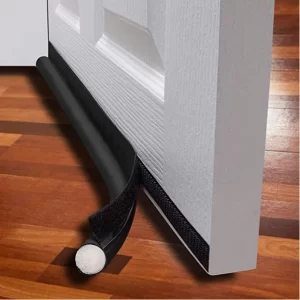
Floors and Walls and Stuff
Hard floors are great for wear but not for the cold. A nice thick rug will help insulate your floors. Decorative rugs can also insulate walls. Hang a thick rug on a wall that is particularly cold such as an outside wall. Throw blankets are great to cuddle under and will make living at a lower thermostat level more tolerable. Adding layers such as a flannel shirt and thick socks can also help you hold on to your body heat.
Save Money
A smart thermostat can control the temperature so that you heat less when you are at work or sleeping and more when you are home and awake. These are easy to install but check with your landlord first. Keep the temperature when you are home just slightly less than comfortable while naked, usually around 68 degrees. You can also turn down the temperature on your water heater by a few degrees. You likely won’t notice the difference but your heating bill will. Keep in mind that the same temperature will feel different at different times of the year. 68 will feel cool in the summer and warm in the winter. Your body adjusts over time.
Check your Vents
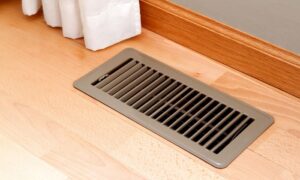
You may have unknowingly placed furniture over your heating vents. If you don’t need heat in that room, that isn’t a problem. However, if you have one frequently used space that isn’t as warm as it should be, the vents are the first place to look. They are usually easy to open and close. If you must have furniture over it, make sure there is room for the heat to escape. You may have to raise the furniture on blocks or two-by-fours to allow air to escape. In addition, most ceiling fans have a reverse switch with will blow the warmer air from the ceiling down improving your airflow.
Special Circumstances
If you lose power or heat during the winter, conserve what heat you do have by keeping doors closed to rooms that are not in use and closing unnecessary rooms and vents. To keep your water lines from freezing, keep the water running at a slow drip or trickle. Also, keep the cabinet doors open under sinks to take advantage of any heat in the room to protect your pipes from freezing. An electric space heater won’t help with no power but may in other situations. A small propane-type heater or camping heater may suffice short term but it is vital to make sure you have good ventilation or you run the risk of dying from carbon dioxide instead of cold.
This winter promises to be cold but with a little preparation, you can weather any storm. If you are looking for a rental property in Durango Colorado, check out The Property Manager. They can help you find a great property to snuggle up in.
Resources
https://www.sciencedaily.com/releases/2015/05/150520193831.htm
https://www.apartmentguide.com/blog/simple-tips-to-save-money-on-your-heating-bill/
https://www.apartmenttherapy.com/no-thermostat-apartment-heat-tips-36868741
https://www.farmersalmanac.com/farmers-almanac-releases-an-extreme-winter-forecast-for-2022-23

